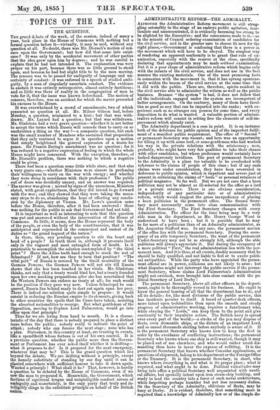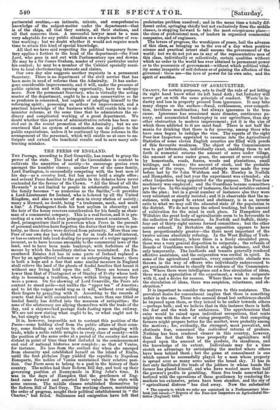ADMINISTRATIVE REFORM—THE ADMIRALTY. .Aranonan the Administrative Reform movement is still
strug- gling ostensibly in the stage of an embryo public agitation, inar- ticulate and unooncentrated, it is evidently becoming too strong to be slighted by the Executive; and the concessions made to it,—as in the minute of Council ordering examination of candidates for the civil service, and in the greater care to choose fit men for the right places,—Government is confessing that there is a wer in the movement which will have to be obeyed. The simplest way c
of rendering an apparent conformity is to grant that rue of ex- amination, especially with the reserve at the close, specifically declaring that appointments may be made without examination. i But it is a ppoor shape of administrative reform which begins only with the infants of the civil service, and does not use in the best manner the existing materials. One of the most promising facts in connexion with the movement is, that it has sprung spontane- ously within the bosom of the civil service at the same time that it did with the public. There are, therefore, spirits resident in the civil service able to administer the reform as well as the public business. Because " the system " is bad, it does not follow that all the individuals engaged under the system are incompetent of better arrangements. On the contrary, many of them have facul- ties as good as any that can be imported into the ranks ; with ex- perience such as no stranger can possess for some time, and every disposition to do what is wanted. A valuable portion of adminis- trative reform will consist in setting free the elements of self-im- provement which already exist.
The Admiralty department is a case in point. It is an instance both of the deference for public opinion and of the imperfect fulfil- ment of a manifest public requirement. The office of " Second " or permanent Secretary was vacant; and here was an opportunity for filling it up with some lord, or some gentleman who had worked his way in the private relations with the aristocracy; men, probably, who might have very fair qualities to take their chance with other candidates, but whose preference would certainly have looked dangerously invidious. The post of permanent Secretary to the Admiralty is a place too valuable to be overlooked with reference to the claims of people of this class • but if any such claims were under consideration, they have been overruled in deference to publio opinion, which is impatient and severe just at present in criticizing the claims of" lords" or personal retainers of political magnates. So far well. But we are not sure that a keen politician may not be almost as ill-selected for the office as a lord or a private retainer. There is one obvious consideration, independently of any particular date or of administrative reform, which would suggest the gross inexpediency of placing a keen politician in the permanent office. The Second Secre- tary must necessarily come into close communication with the First Secretary. The First Secretary changes with every Administration. The officer -for the time being may be a very able man in the department, as Mr. Henry George Ward is understood to have been ; but it is possible that he may be far more of a politician than of an Admiralty administrator, as Mr. Augustus Stafford was. In any case, the permanent motion of the office lies with the permanent Secretary. During the emu-
ncly of an able temporary Secretary, the want of the permanent Under-Secretary may not be so strongly felt, although the able politician will always appreciate it. But during the occupancy of a mere political " First," the real administration lies with the per- manent man. And it is thus, at all events, doubly necessary that he should be fully qualified, and not liable to feel or to excite politi- cal antipathies. While the party who have appointed the perma- nent official are in power, collisions are not likely to arise; but what disputes might not interrupt the public service if the perma- nent Secretary, whose claims Lord Palmerston's Administration might not overlook, were brought into close contact with the po- litical Secretary of Lord Derby !
The permanent Secretary, above all other officers in the depart- ment, ought to be thoroughly versed in his business. He ought to 'know the general bearing of all that the department has to do, and all its details; for, like most divisions of the public service, this has incidents pecular to itself. A board of quarter-deck officers, more intent upon techicalities than upon the smooth and steady progress of administrative working, requires a functionary who, while obeying the " Lords," can keep them to the point and give continuity to their impulsive action. The British navy is spread over every part of the world ;—a stroke of the pen may dispose of fleets, even dismantle ships, at the dictate of an impatient Lord, and so cancel thousands sterling before anybody is aware of it. It is the permanent Secretary who knows how to keep the fleet in order by the avoidance of conflicting instructions; the permanent Secretary who knows where one ship is still wanted, though it may be placed out of use elsewhere, and who would rather avoid dis- mantling than have to incur the expense of refitting. It is the permanent Secretary that knows whether Consular applications, or questions of shipwreck, belong to his department or the Foreign afice or the Treasury. It is the permanent Secretary, in short, who knows where everything is, and what is its proper place ; what is required, and what ought to be done. Political vicissitudes may bring into office a political Secretary well acquainted with nauti- cal affairs, but specially intent upon iron steam-ship building, and ready to lead the country into a furor of such naval architecture; while forgetting perhaps humbler but not less necessary duties Or the Secretary of the Admiralty, oblivious of fleets, may be busy at Derby. It is evident, therefore, that something more la required than a knowledge of Admiralty law or of the simple de. partmental routine,—an intimate, minute, and comprehensive knowledge of the subject-matter under the department—that is of the ships, all that they contain, all their stations, and all that concerns them. A successful lawyer must be a man very adaptable for any public situation as a simple matter of rou- tine working ; but we doubt whether it would not require much time to attain this kind of special knowledge. All that we have said respecting the political temporary Secre- tary applies a fortiori to the head of the department—the First Lord, who goes in and out with Parliamentary ups and downs. He may be a Sir James Graham, master of every particular under his control ; he may be a member of the Cabinet specially sensi- tive to local electioneering interests and claims.
Our own day also suggests another requisite in a permanent Secretary. There is no department of the civil service that has been more in need of reforms than the Admiralty. It has under- gone considerable improvements, and it will, under the pressure of public opinion and with opening opportunity, have to undergo more. Now the permanent Secretary, who is virtually the acting master of the department, ought to be a man conservative so far as prudence is concerned, but capable of adapting himself to the reforming spirit ; possessing an ardour for improvement, and a practical knowledge of the business which will enable him to ad- minister reforms, at the same time that he administers the or- dinary and complicated working of a great department. We doubt whether this portion of administrative reform has been car- ried out in the recent promotion of the Admiralty ; but we are convinced that no system of examination can do justice to the public expectations, unless it be continued by these reforms in the arrangement of the personnel, which will enable us at once to an- ticipate and extend the beneficial results and to save many sub- tracting mistakes.



































 Previous page
Previous page